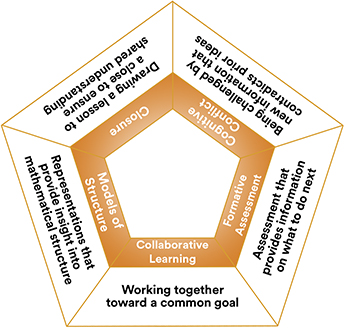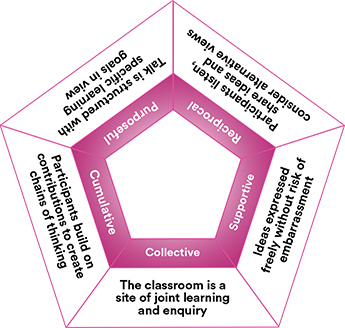Dialogic Learning
Collaboration amongst students is central to the programme. There is considerable evidence to indicate dialogic learning raises students’ levels of achievement. Studies consistently show benefits to learning when compared to classes where the students study individually.
In line with the research, the trials of the programme revealed that students could learn from one another and were less reliant on the teacher as the 'source of all knowledge’. Many students developed a ‘can do’ attitude towards mathematics.
Through participating in the programme, teachers develop a range of interrelated pedagogies that promote dialogic learning in the classroom.
Teachers learn about how to initiate and sustain discussion through:
-
Inviting students to speak
- Listening silently to student discussion
-
Introducing ‘ground rules’ of student discussion
- consider all opinions
- reach consensus
- share ideas
- encourage continued
speaking
-
Focusing students' talk on the task
Lead teachers from the Maths-for-Life programme explain how they think about dialogic learning.
Teacher strategies to promote dialogic learning
Teacher pedagogies

Characteristics of student talk

Five key pedagogies
These teacher strategies seek to foster joint learning through student dialogue characterized by five dimensions:
Challenges for teachers
From the trials, we found teachers had pressing concerns about a number of aspects of dialogic learning, these are listed below. These very real concerns are explicitly addressed throughout the programme.
Time pressures
It's a gallop to the main exam, we don't have time for discussion.
Students will waste time in social talk. They would rather talk about what's on TV, rather than maths.
Control
What will other teachers think of the noise?
What if they stray off the point of the lesson?
Personal insecurity
What if they start asking questions I cannot answer?
My students are too afraid of being seen to be wrong.
Views of the students
My students cannot discuss this.
My students are too afraid of being seen to be wrong.
Views of the subject
Answers are either right or wrong - there is nothing to discuss.
If they understand there is nothing to discuss, and if they don't, they are in no position to discuss anything. In fact they may even spread their own misconceptions.
Views of learning
Mathematics is a subject where you listen and practice
Learning is a private activity